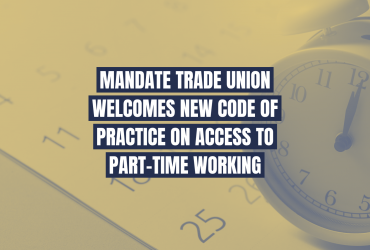Congress President Calls for Immediate Release of Cuban Five
Thursday 12 September 2013Mandate General Secretary and President of the Irish Congress of Trade Unions, John Douglas, has today (Sept 12) called for the immediate release of the ‘Cuban Five’ from custody in the United States and for them to be allowed to return to their homes and families in Cuba.
Speaking ahead of a vigil to be held later today in Dublin to mark the men’s fifteenth year in prison, Mr Douglas said: “The entire process surrounding the conviction of the Cuban Five was dubious to say the least and, in the interests of justice, the US government must release these men immediately and allow them to return to their home country.
“Following yesterday’s anniversary of the September 11, 2001 attacks on the United States, it is ironic to consider that these men were jailed for their role in trying to prevent terror attacks on their homeland, by Cuban exiles based in the United States.
“They should be erecting statues to these men, not jailing them,” Mr Douglas said.
One of those attacks – a no warning bomb in a Havana Hotel – killed a young Italian tourist, in 1997, while in 1976 a bomb on a Cubana airliner killed all 73 people on board.
The Cuban Five were imprisoned in the United States after being arrested by the Federal Bureau of Investigations (FBI) on 12th September 1998.
The five men – Gerardo Hernández, Ramón Labañino, Antonio Guerrero, Fernando González and René González – were investigating the activities of Cuban exile terror groups based in the United States when they were arrested.
They were convicted in a Miami court of conspiracy to commit espionage, conspiracy to commit murder, acting as an agent of a foreign government, and other illegal activities.
Mr Douglas added, “In 2005, the United Nations Commission on Human Rights adopted a report stating that ‘the trial did not take place in the climate of objectivity and impartiality that is required in order to conform to the standards of a fair trial’.”
The convictions and sentences of the Cuban 5 have been strongly contested by the men and their many supporters, including Archbishop Desmond Tutu and former US President Jimmy Carter.
At least eight international Nobel Prize winners have written to the US Attorney General calling for the release of the men and Amnesty International has criticised their treatment in custody, describing it as “unnecessarily punitive and contrary to standards for the humane treatment of prisoners.”
In May of this year, René González, who had been released on parole, was allowed to return to Cuba after renouncing his United States citizenship.
The vigil will take place today at the Spire on O’Connell Street, Dublin, from 6-7pmpm and will mark the men’s fifteenth year of imprisonment, during which contact with their families has been severely restricted.
People attending are being asked to wear a yellow ribbon in support of the men.
NOTE TO EDITORS
- Terrorist attacks against Cuba by have killed 3,478 people and injured 2,099, the majority carried out by Miami-based Cuban exiles and paramilitary groups. This included the October 1976 bombing of a Cubana airliner, killing all 73 passengers.
- Gerardo Hernandez, Ramón Labañino, Fernando Gonzalez, Antonio Guerrero and René Gonzalez were accused of the vague crime of conspiracy to commit espionage. The US government never accused them of actual espionage, nor did it affirm that real acts of espionage had been carried out, as no classified document had been confiscated from them.
- The trial of the men lasted over six months and included the testimonies of three retired Army generals and a retired admiral, who agreed that evidence of espionage did not exist.
- In August 2005 a three-judge panel of the court of appeals revoked all of the convictions on the grounds that the five accused had not received a fair trial in Miami. The US government intervened and on August 2006, in spite of the strong disagreement voiced by two of the three judges who made up the panel, a new Court revoked, by majority, the decision of the three judges.






